LOVE COMES TO HARVEST– (THE BOOK OF RUTH CONTINUED)
“The Book of Ruth” (Megillat Ruth) is read by the Jews every year on the Feast of Shavuot, (the Festival of Weeks, Pentecost). It is also called “the Festival of Reaping”.
“The Book of Ruth” is about a childless widow, born outside the covenant of God who reaps an abundant harvest that was sown by the hand of Another. This is what grace is all about! Unmerited favor! Greatest Riches at Christ’s Expense.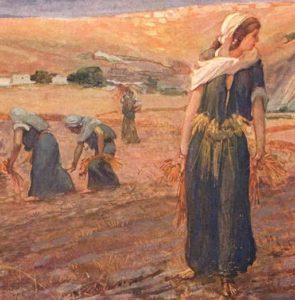
She who was foreign born, identifies by faith with the God of Israel, and finds herself gleaning in the field of a man who would prove to be her Kinsman Redeemer. As a result, she would be grafted into the seed of Abraham and through her descendants would come Abraham’s Promised Seed, the Messiah (Matthew 1:5).
‘Shavuot’ is also called ‘Pentecost’ because it is linked to the Passover, being the fiftieth day after the Passover Sabbath.
On the Passover, the Lamb of God, Christ, was slain (1 Cor 5:6). The Promised Seed of Abraham fell into the ground and died (John 12:24). That perfect seed was made alive again, first, as it appeared in resurrection power on the third day, the Feast of Firstfruits, and then, seven weeks later in the first harvest on the Day of Pentecost (Acts 2). On that day, the life of Christ was reproduced by the power of the Holy Spirit in those gathered by faith in the preaching of the gospel. It was a day of grace. Great grace! What happened at Pentecost, as the seed of Christ’s life was reproduced in an abundant harvest of more than 3000 souls, was a direct consequence of what had preceded it— the death, burial and resurrection of Christ.
Because of what the Law had decreed and what Boaz did, a person born outside the covenant promises of God, reaps a harvest of favor. In the story of Ruth and the celebration of Shavuot we see another foreshadowing of the gospel.
The command to celebrate “Shavuot” (Leviticus 23:15-21) is immediately followed by the command to make provision at the time of harvest for the poor, the widow, the orphan and the foreigner, that is, the Gentile (Leviticus 23:22). The blessings Christ has won for His chosen people are to be shared with all the nations!
Traditionally the Feast of Shavuot commemorates the giving of the Law at Sinai. (Remember- 3,000 died on that day; Exodus 32:28). On that occasion, God wrote the Law on tables of stone. When the Day of Pentecost fully comes, in Acts Chapter 2, 3,000 are saved, the New Covenant promise is fulfilled, and the Law is written on the fleshy tables of the heart (Ezekiel 36:26-27).
According to the Book of Leviticus, on the Feast of Shavuot two leavened loaves of bread were lifted up by the High Priest as Mediator in one united movement before the Lord. What a picture of the New Testament harvest this is! It is a wave offering representing what was to come, two people groups, Jews and Gentiles, being lifted up in the same single offering by the hands of the same High Priest (Lev. 23:17-20).
In the Book of Ruth, we see two parties, (2 loaves) a Jewess, Naomi, and a Gentile, Ruth, brought into the experience of the mercy of the Law by the mediation of Another (Boaz). By the same action, the household and heritage of Elimelech (lit. “My God is King”) is restored and Ruth, the believing Gentile is grafted in to the promises of the covenant. The testimony of the Kingdom of God, the Name of “My God is King” is no longer forgotten in Israel!
The Law said the redemption of the lost inheritance was a possibility, but it did not have the power to will it or perform it. The Redemption required a Fit Intercessor (The name ‘Boaz’ means ‘In Him is strength’). Redemption was not a possibility until the Kinsman-Redeemer Boaz came along. We can see in this story an illustration of the principle found in the Book of Romans:
Romans 8:3-4 For what the Law could not do, weak as it was through the flesh, God did: sending His own Son in the likeness of sinful flesh and as an offering for sin, He condemned sin in the flesh, [4] so that the requirement of the Law might be fulfilled in us, who do not walk according to the flesh but according to the Spirit.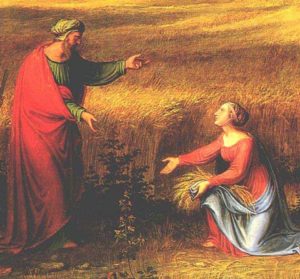
The Book of Ruth, like the Feast of Shavuot, celebrates the mercy of the law. It also celebrates the Mediator of a New Covenant (Boaz) who ensures that the mercy of the Law falls upon those who would not otherwise have access to it.
There were a number of merciful provisions written in the Law of God that Ruth chose to lay hold of by faith:
- The Israelites were commanded to leave the corners of their fields unharvested so the poor, the widows and the foreigners would be able to fully reap them for food. (Lev 19:9-10; Lev 23:22)
- Widows, orphans and foreigners were encouraged to follow behind the Israelite harvesters and collect any grain that they had missed (the gleanings). (Deut 24:19-22)
- When a widow is childless, leaving no heir to carry on the name of her deceased husband, his brother, or near relative, is to take the responsibility of marrying the man’s widow so his name will not be forgotten and his inheritance restored to the family. This provision is called the levirate marriage (called ‘Yibum’ in Hebrew) and is described in Deuteronomy 25:5-6.
Ruth put her faith in God’s Word. She believed that the God of Israel loved her and had made provision for her, so she asks Naomi if she might follow the reapers and glean the leftovers according to the provisions written in God’s Word. Naomi gives Ruth permission to go.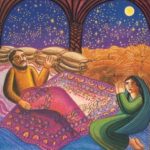
This was an act of faith on Ruth’s part. God’s guiding hand is evident as Ruth finds herself in fields owned by a man named Boaz, a near relative of Naomi’s deceased husband, Elimelech.
Boaz is a type of Jesus Christ, the Greater Kinsman Redeemer. In the Incarnation, God became one of us, a kinsman. He was tempted at every point as we are tempted, yet without sin. He lives a life of full confidence in God the Father who sent Him and lives out from His sufficient resources.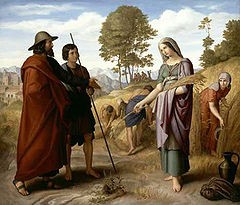
Boaz is described as a man of great wealth, great resources and great standing. His name means “In him is strength”.
Ruth finds grace, safety and acceptance under the care of the Lord of the harvest. Boaz commands her not to go to the field of another, assuring her that what she discovers here will be more than sufficient.
He invites Ruth to dine with the reapers and he serves her roasted grain.
Whereas the Law commanded that foreigners could take whatever leftovers they could find after the fields had been picked over by the reapers, Boaz commanded his workers to deliberately leave behind handfuls of grain for Ruth to glean (Ruth 2:16) and not to treat her with scorn.
When Ruth returns to tell Naomi of the providences, she had experienced that day, the protection, provisions and privileges she was offered by Boaz, Naomi tells her of the Greater Providence, that Boaz is her deceased husband’s close relative. According to the Law, Boaz is qualified to redeem the lost inheritance of Elimelech. The question is: Would he be willing?
The Book of Ruth is not just the story of the Mercy of the Law, but a Heart of Love.
It is easy for the reader to see that Ruth has a special place in Boaz’s affections. But Naomi does not know this and she coaches Ruth as to how she can both capture his interest and make her request that he act as her kinsman redeemer.
The barley harvest is finally being reaped. The grain must be separated from chaff on the threshing floor.
The threshing floor has great symbolic meaning. It is the place where separation takes place. The grain was separated from the stalks and chaff. Animals would walk on the stalks and crush them. The crushed stalks would release the grain (Deut 25:4). Workers would throw the grain into the air and the wind would blow the lighter chaff away and the heavier grain would fall to the ground to be sifted, gathered, and carried away for storage or to be brought to the market.
God has a plan to separate the wheat from the tares and the chaff from the grain. He does this sifting at the Cross of Christ.
Four times in chapter 3 we read about the feet of Boaz. In the first two instances, Ruth is to uncover his feet- a prophetic picture of our recognition that we need “the walk of our Redeemer” who would lay down His life to fulfill the law on our behalf. For her to place herself at his feet was not only to adopt a position of submission but to claim his feet as her own. It was asking him to obey the law of the kinsman redeemer and take her as his own- It was a proposal for marriage.
To extend the border of one’s mantle over a person is to claim that person for yourself. The word for skirt is translated elsewhere as “wing”. It means to come under the wings, or care, of another.
Why did she not wait for him to ask her to marry her? Because Boaz was an older man, he fully expected that she would marry someone younger (3:10). Another reason is that there was another man in town who was a closer relative than Boaz. He had the first option of exercising the provision of a levirate marriage (3:12). Perhaps Naomi knew of this and wanted Ruth to force the issue by approaching the more preferable candidate, Boaz, a man of good standing, who would then have to take the initiative and persuade the nearer kinsman to waive his rights.
Boaz responds positively to Ruth’s request and pledges to do all he can to solve the problem of the nearer kinsman.
The Qualifications of a Kinsman Redeemer (Hebrew ‘Goel’)
- The ‘Goel’ must be related by blood to the family he redeems.
Heb 2:14
- He must be able to pay the price of redemption.
(1 Peter 1:18-19)
- He must be willing to redeem.
(John 10:15)
- He must be free Himself (not indebted to another).
Jesus perfectly meets the qualifications. He became flesh and blood. He alone is able to pay the price to redeem us- a sinless life. He was free from any debt to the law. He was willing to lay down His life for us.
The Book of Ruth concludes with a joyous ending. Boaz marries Ruth. The Lord enables Ruth to conceive a child to restore the family inheritance in the Name of Elimelech- ‘My God is King’. The child’s name is Obed, meaning ‘servant’.
Obed becomes the father of Jesse, and Jesse, the father of David, whose Greater Son is The Servant King who redeems us and qualifies us as fellow-heirs in the harvest of grace!
READING FROM THE NEW TESTAMENT: John 4:43-54;
We see the prediction of the rejection of Israel’s Messiah and His acceptance by the Gentiles as Jesus departs Judea after the Passover and is welcomed in Galilee.
This incident parallels what is recorded in Matthew:
Matthew 4:12-16 (NASB) 12 Now when Jesus heard that John had been taken into custody, He withdrew into Galilee; 13 and leaving Nazareth, He came and settled in Capernaum, which is by the sea, in the region of Zebulun and Naphtali. 14 This was to fulfill what was spoken through Isaiah the prophet: 15 “THE LAND OF ZEBULUN AND THE LAND OF NAPHTALI, BY THE WAY OF THE SEA, BEYOND THE JORDAN, GALILEE OF THE GENTILES— 16 “THE PEOPLE WHO WERE SITTING IN DARKNESS SAW A GREAT LIGHT, AND THOSE WHO WERE SITTING IN THE LAND AND SHADOW OF DEATH, UPON THEM A LIGHT DAWNED.”
The second sign event is the healing of the nobleman’s son. The first sign was given in the face of the social failure at a wedding ceremony. The second sign is in the face of human grief.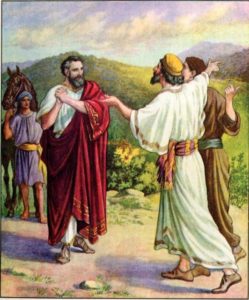
A government official from Capernaum asks Jesus to heal his dying son. Jesus tells him that his son is healed and to return home. He discovers that the boy was healed the moment that Jesus said, “Your son will live!”
Both miracles took place in Cana. Both were on the third day. Both were by request. Mary summoned Jesus at the wedding and the nobleman asked for his son’s healing. Both were met with soft rebukes. Both miracles required the obedience of faith. The servants at the wedding filled the six empty water pots and the nobleman went home believing. In both miracles we see the Word at work, for Jesus did nothing but speak. In both cases, those who witnessed the miracles believed.
These signs call us to believe that Jesus is the Son of God. By believing Him, the water is turned to wine, joy is returned to the wedding, and life is restored to the dead.
READING FROM PSALMS: Psalm 105:16-36;
Psalm 105:19 (NASB) 19 Until the time that his word came to pass, the word of the LORD tested him.
It is good to be reminded of these two facts. God will fulfill His Word. But in the meanwhile, He is testing our character. Are we holding true to the promise and the Promiser?
The Psalmist recounts the history of Israel from Joseph being sold into slavery by his brothers to the surprise outcome, Joseph’s exaltation to the right hand of Pharaoh. Then he fast forwards us to Israel’s emergence from their oppression in Egypt as a great nation miraculously delivered at the first Passover.
READING FROM PROVERBS
Proverbs 14:26-27 (NASB) 26 In the fear of the LORD there is strong confidence, and his children will have refuge. 27 The fear of the LORD is a fountain of life, that one may avoid the snares of death.
Fear of the Lord is the reverence that stems from an accurate recognition of Who He is, and results in an absolute reliance upon Him.
PRAYING FOR THE NATIONS
CYPRUS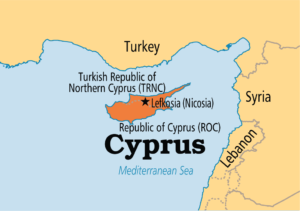
Republic of Cyprus (South only)
Europe
Geography
Area: 9,251 sq. km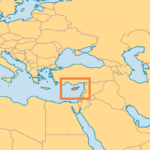
Strategic island in northeast Mediterranean Sea. ROC in the south is 64% of the island, TRNC in the north is 36%.
Population: 879,723 Annual Growth: 1.02%
Capital: Lefkosia (Nicosia)
Urbanites: 70.3%
HDI Rank: 32 of 182 (UN Human Development Reports 2009)
Peoples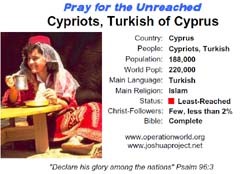
Peoples: 19 (16% unreached) All peoples
Unreached Peoples Prayer Card
Official language: Greek; Turkish Languages: 6 All languages
Religion
Largest Religion: Christian
|
Religion |
|
Pop % |
Ann Gr |
|
637,095 |
72.42 |
0.9 |
|
|
6,616 |
0.8 |
3.0 |
Challenges for Prayer
The 50 year conflict between the two communities, fuelled by the involvement of foreign powers, has gone on too long. Political intransigence by a few hampers the reunification seemingly favored by the majority. Pray that old grievances and bitterness might be overcome by forgiveness. Pray that external meddling would stop and that Cypriots might move forward into a united future. Since 2004, Cypriot and EU citizens have been free to cross the dividing line. A greater degree of interaction between the communities has shown that, for more, it is possible to live together in peace.
Evangelical Churches among the Greeks are few. Negative prejudice is easing but still holds many back. Pray that the unease of Cypriots with evangelicals may be removed and that significant church growth may begin.
Ethnic minority evangelicals have grown rapidly among English speaking Russian, Filipino, Sri Lankan and Iranian communities. Pray for their active and effective witness to their own communities and to the indigenous population.
PRAYER: Father, we praise You for the merciful provision of a Kinsman-Redeemer who fulfills the Law, lays down His life to redeem and restore the lost inheritance of humanity and receive a bride as His co-regent. We will sing of Your mercies forever! All glory, honor and power to You, Almighty God. Thank You for the gift of fellowship through Jesus Christ our Lord. Amen.
-Pastor David
